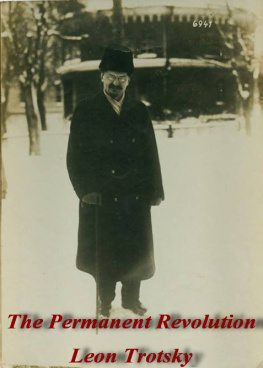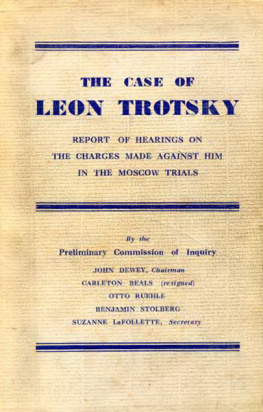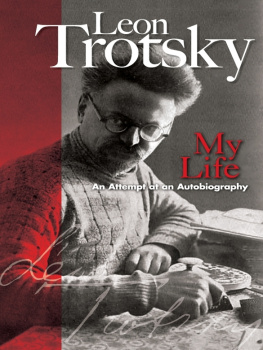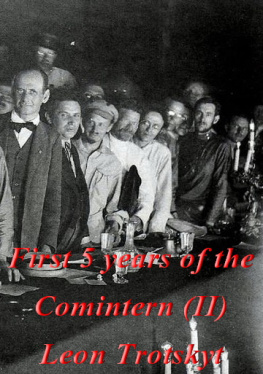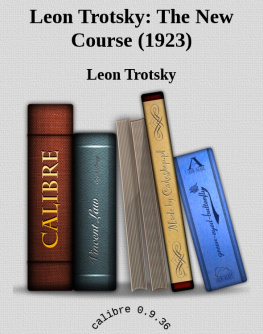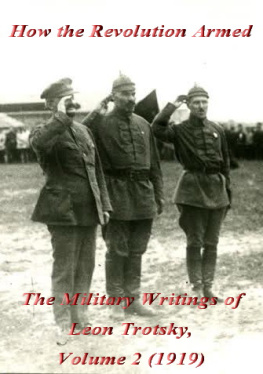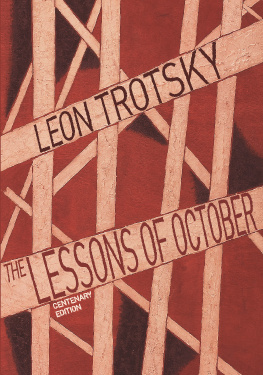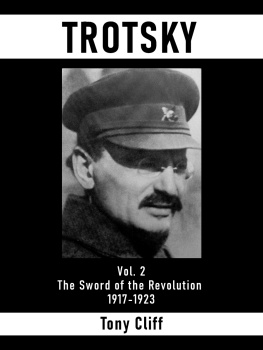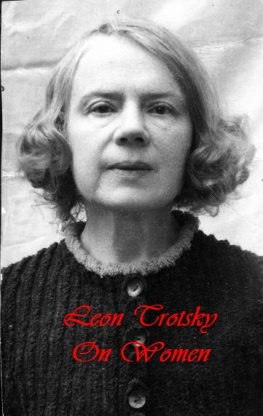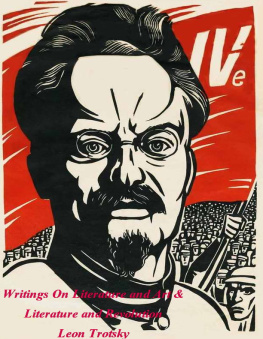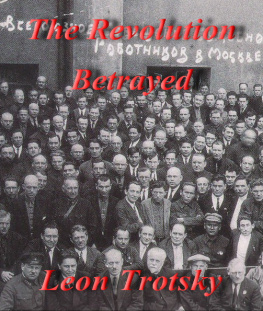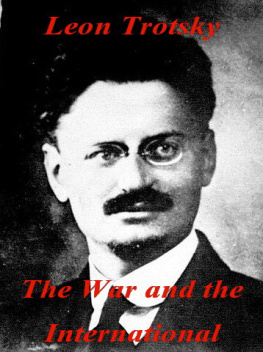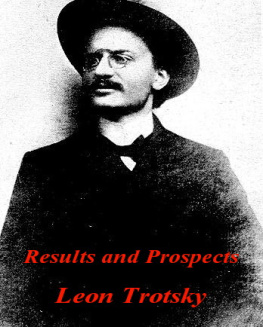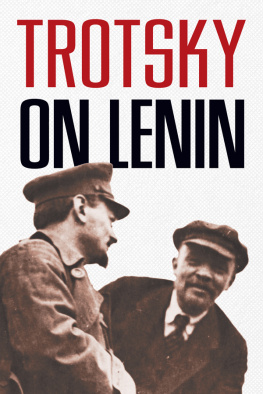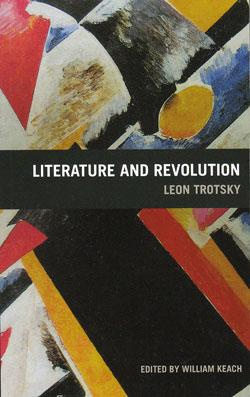Trotsky - The Permanent Revolution (1931)
Here you can read online Trotsky - The Permanent Revolution (1931) full text of the book (entire story) in english for free. Download pdf and epub, get meaning, cover and reviews about this ebook. publisher: Marxists Internet Archive, genre: Politics. Description of the work, (preface) as well as reviews are available. Best literature library LitArk.com created for fans of good reading and offers a wide selection of genres:
Romance novel
Science fiction
Adventure
Detective
Science
History
Home and family
Prose
Art
Politics
Computer
Non-fiction
Religion
Business
Children
Humor
Choose a favorite category and find really read worthwhile books. Enjoy immersion in the world of imagination, feel the emotions of the characters or learn something new for yourself, make an fascinating discovery.
The Permanent Revolution (1931): summary, description and annotation
We offer to read an annotation, description, summary or preface (depends on what the author of the book "The Permanent Revolution (1931)" wrote himself). If you haven't found the necessary information about the book — write in the comments, we will try to find it.
The Permanent Revolution (1931) — read online for free the complete book (whole text) full work
Below is the text of the book, divided by pages. System saving the place of the last page read, allows you to conveniently read the book "The Permanent Revolution (1931)" online for free, without having to search again every time where you left off. Put a bookmark, and you can go to the page where you finished reading at any time.
Font size:
Interval:
Bookmark:
Transcribed and HTML markup for the Trotsky Internet Archive, a subarchive ofthe Marxist writers Internet Archive, bySally Ryan in 1996.
Permanent Revolution was first published by the Left Opposition in Russian inBerlin in 1930.
First English and American editions of Permanent Revolution 1931, re-translated byJohn G. Wright, for Progress Publishers/Militant Publishing Association.
Converted to eBook format by Kollektiv Yakov Perelman, from the on-line version of ThePermanent Revolution available at TrotskyInternet Archive in October 2013. Cover provided by Cm Nikas.
1.
2.
3.
4.
5.
6.
7.
8.
9.
10.
T he demand for theory in the party under the leadership ofthe Right-Centrist bloc has been met for six successive years by anti-Trotskyism, this being theone and only product available in unlimited quantities and for free distribution. Stalin engaged intheory for the first time in 1924, with the immortal articles against the permanent revolution.Even Molotov was baptized as a leader in this font. Falsification is in full swing. Afew days ago I happened upon an announcement of the publication in German of Lenins writingsof 1917. This is an invaluable gift to the advanced German working class. One can, however, picturein advance what a lot of falsifications there will be in the text and more especially in the notes.It is enough to point out that first place in the table of contents is given to Leninsletters to Kollontai in New York. Why? Merely because these letters contain harsh remarks about me,based on completely false information from Kollontai, who had given her organic Menshevisman inoculation of hysterical ultra-leftism in those days. In the Russian edition the epigones werecompelled to indicate, even if only ambiguously, that Lenin had been misinformed. But it may beassumed that the German edition will not present even this evasive reservation. We might also addthat in the same letters of Lenin to Kollontai there are furious assaults upon Bukharin, with whomKollontai was then in solidarity. This aspect of the letters has been suppressed, however, for thetime being. It will be made public only when an open campaign against Bukharin is launched. Weshall not have to wait very long for that. On the other hand a number of very valuable documents, articles and speechesof Lenins, as well as minutes, letters, etc., remain concealed only because they aredirected against Stalin and Co. and undermine the legend of Trotskyism. Of thehistory of the three Russian revolutions, as well as the history of the party, literally not asingle shred has been left intact: theory, facts, traditions, the heritage of Lenin, all these havebeen sacrificed to the struggle against Trotskyism, which was invented and organized,after Lenin was taken ill, as a personal struggle against Trotsky, and which later developed into astruggle against Marxism.
It has again been confirmed that what might appear as the most useless raking up of long-extinctdisputes usually satisfies some unconscious social requirement of the day, a requirement which, initself, does not follow the line of old disputes. The campaign against the oldTrotskyism was in a reality a campaign against the October traditions, which had become moreand more cramping and unbearable for the new bureaucracy. They began to characterize asTrotskyism everything they wanted to get rid of. Thus the struggle against Trotskyismgradually became the expression of the theoretical and political reaction among broadnon-proletarian and partly also among proletarian circles, and the reflection of this reactioninside the party. In particular, the caricatured and historically distorted counterposition of thepermanent revolution to Lenins line of alliance with the muzhiksprang full-grown in 1923. It arose along with the period of social, political and party reaction,as its most graphic expression, as the organic antagonism of the bureaucrat and the property-ownerto world revolution with its permanent disturbances, and the yearning of thepetty-bourgeoisie and officialdom for tranquillity and order. The vicious baiting of the permanentrevolution served, in turn, only to clear the ground for the theory of socialism in one country,that is, for the latest variety of national socialism. In themselves, of course, these new socialroots of the struggle against Trotskyism do not prove anything either for or againstthe correctness of the theory of the permanent revolution. Yet, without an understanding of thesehidden roots, the controversy must inevitably bear a barren academic character.
In recent years I have not found it possible to tear myself away from the new problems andreturn to old questions which are bound up with the period of the 1905 Revolution, in so far asthese questions are primarily concerned with my past and have been artificially used against it. Togive an analysis of the old differences of opinion and particularly of my old mistakes, against thebackground of the situation in which they arose an analysis so thorough that thesecontroversies and mistakes would become comprehensible to the young generation, not to speak of theold-timers who have fallen into political second childhood this would require a wholevolume to itself. It seemed monstrous to me to waste my own and others time upon it, whenconstantly new questions of enormous importance were being placed on the order of the day: thetasks of the German Revolution, the question of the future fate of Britain, the question of theinterrelationship of America and Europe, the problems broached by the strikes of the Britishproletariat, the tasks of the Chinese Revolution and, lastly and mainly, our own internal economicand socio-political contradictions and tasks all this, I believe, amply justified mycontinual putting-off of my historico-polemical work on the permanent revolution. But socialconsciousness abhors a vacuum. In recent years this theoretical vacuum has been, as I have said,filled up with the rubbish of anti-Trotskyism. The epigones, the philosophers and the brokers ofparty reaction slipped down ever lower, went to school under the dull-witted Menshevik Martynov,trampled Lenin underfoot, floundered around in the swamp, and called all this the struggle againstTrotskyism. In all these years they have not managed to produce a single work serious or importantenough to be mentioned out loud without a feeling of shame; they did not bring forth a singlepolitical appraisal that has retained its validity, not a single prognosis that has been confirmed,not a single independent slogan that has advanced us ideologically. Nothing but trash and hack-workeverywhere.
Stalins Problems of Leninism constitutes a codification of thisideological garbage, an official manual of narrow-mindedness, an anthology of enumerated banalities(I am doing my best to find the most moderate designations possible). Leninism byZinoviev is ... Zinovievist Leninism, and nothing more or less. Zinoviev acts almost onLuthers principle. But whereas Luther said, Here I stand; I cannot dootherwise. Zinoviev says, Here I stand ... but I can do otherwise, too. Tooccupy oneself in either case with these theoretical products of epigonism is equally unbearable,with this difference: that in reading Zinovievs Leninism one experiencesthe sensation of choking on loose cotton-wool, while Stalins Problems evokes the sensationof finely-chopped bristles. These two books are, each in its own way, the image and crown of theepoch of ideological reaction.
Fitting and adjusting all questions, whether from the right or the left, from above or below,from before or behind to Trotskyism, the epigones have finally contrived to make everyworld event directly or indirectly dependent upon how the permanent revolution looked to Trotsky in1905. The legend of Trotskyism, chock-full of falsifications, has become to a certain extent afactor in contemporary history. And while the right-centrist line of recent years has compromiseditself in every continent by bankruptcies of historic dimensions, the struggle against the centristideology in the Comintern is today already unthinkable, or at least made very difficult, without anevaluation of the old disputes and prognosis that originated at the beginning of 1905.
Font size:
Interval:
Bookmark:
Similar books «The Permanent Revolution (1931)»
Look at similar books to The Permanent Revolution (1931). We have selected literature similar in name and meaning in the hope of providing readers with more options to find new, interesting, not yet read works.
Discussion, reviews of the book The Permanent Revolution (1931) and just readers' own opinions. Leave your comments, write what you think about the work, its meaning or the main characters. Specify what exactly you liked and what you didn't like, and why you think so.

